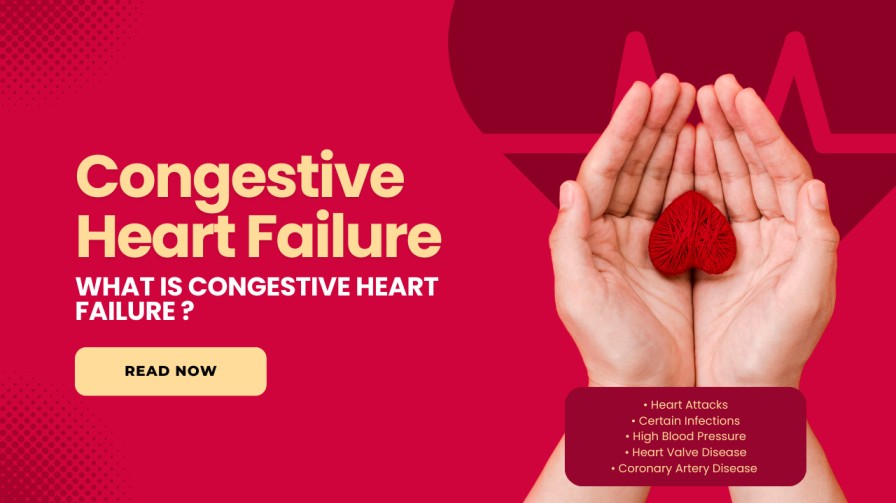Understanding the Heart
Your heart is a powerful muscle that pumps blood throughout your body. It works tirelessly, day and night, to deliver oxygen and nutrients to your organs and tissues.
How the Heart Works
Your heart has four chambers: two upper chambers (atria) and two lower chambers (ventricles). The right side of the heart pumps blood to the lungs, where it picks up oxygen. The left side of the heart pumps oxygen-rich blood to the rest of the body.
Common Heart Conditions
Several heart conditions can weaken the heart muscle and lead to heart failure. Some of the most common include:
- Coronary artery disease: A condition in which plaque builds up in the arteries that supply blood to the heart.
- High blood pressure: Chronic high blood pressure puts extra strain on the heart.
- Heart valve disease: Damaged heart valves can disrupt blood flow.
- Heart arrhythmias: Irregular heart rhythms can weaken the heart.
What is Congestive Heart Failure?
Congestive heart failure (CHF) occurs when your heart muscle becomes too weak to pump blood efficiently. As a result, blood can back up in your lungs and other organs, causing various symptoms.
How Does Congestive Heart Failure Develop?
Over time, damage to the heart muscle can lead to heart failure. This damage may be caused by various factors, including:
- Heart attacks
- High blood pressure
- Coronary artery disease
- Heart valve disease
- Certain infections
Types of Congestive Heart Failure
There are two main types of congestive heart failure:
- Systolic heart failure: This occurs when the heart’s pumping chambers don’t contract forcefully enough.
- Diastolic heart failure: This occurs when the heart’s filling chambers become stiff, making it harder for the heart to fill with blood.
Symptoms of Congestive Heart Failure
The symptoms of congestive heart failure can vary depending on the severity of the condition. Some common symptoms include:
Early Symptoms
- Fatigue
- Shortness of breath, especially with exertion
- Persistent cough, often worse at night
- Swelling in the ankles, feet, legs, abdomen, or lungs
- Rapid or irregular heartbeat
- Reduced appetite
- Difficulty concentrating
Late-Stage Symptoms
- Severe shortness of breath
- Persistent cough with frothy sputum
- Rapid weight gain due to fluid buildup
- Swelling in the neck veins
- Confusion
- Irregular heart rhythm
Diagnostic Tests for Congestive Heart Failure
To diagnose congestive heart failure, your doctor may perform the following tests:
- Physical Exam: Your doctor will listen to your heart and lungs, check for swelling, and measure your blood pressure.
- Blood Tests: To check for signs of heart damage and other underlying conditions.
- Chest X-ray: To assess the size of your heart and lungs and check for fluid buildup.
- Electrocardiogram (ECG): To measure the electrical activity of your heart.
- Echocardiogram: To visualize the structure and function of your heart.
- Stress Test: To evaluate your heart’s response to exercise.
Treatment Options for Congestive Heart Failure
The treatment for congestive heart failure aims to improve heart function, reduce symptoms, and prevent complications. Here are some common treatment options:
- Lifestyle Modifications:
- Diet: A low-sodium diet can help reduce fluid retention.
- Exercise: Regular physical activity can strengthen your heart muscle.
- Weight Management: Losing weight can reduce the strain on your heart.
- Stress Management: Techniques like meditation and yoga can help reduce stress.
- Medications:
- Diuretics: These medications help your kidneys remove excess fluid.
- ACE Inhibitors: These medications help relax blood vessels and reduce the workload on the heart.
- Beta-Blockers: These medications slow down your heart rate and reduce blood pressure.
- Angiotensin Receptor Blockers (ARBs): These medications also help relax blood vessels and reduce the workload on the heart.
- Medical Procedures:
- Cardiac Catheterization: A procedure to diagnose and treat heart conditions.
- Implantable Cardioverter-Defibrillator (ICD): A device implanted in the chest to regulate heart rhythm.
- Cardiac Resynchronization Therapy (CRT): A procedure to help the heart’s lower chambers pump blood more efficiently.
- Heart Transplant: In severe cases, a heart transplant may be necessary.
Prevention of Congestive Heart Failure
While there’s no guaranteed way to prevent heart failure, you can take steps to reduce your risk:
- Healthy Lifestyle: Maintain a healthy weight, eat a balanced diet, and exercise regularly.
- Regular Check-ups: Schedule regular check-ups with your doctor to monitor your blood pressure, cholesterol, and other risk factors.
- Managing Underlying Conditions: Control conditions like high blood pressure, diabetes, and high cholesterol.
Conclusion
Congestive heart failure can significantly impact your quality of life. However, early detection and treatment can help manage the condition and improve your outlook. By making healthy lifestyle choices and seeking regular medical care, you can reduce your risk of developing heart failure and live a longer, healthier life.
FAQs
- Can congestive heart failure be cured? While there’s no cure for congestive heart failure, treatments can help manage symptoms and improve quality of life.
- What are the signs of worsening heart failure? Signs of worsening heart failure include increased shortness of breath, rapid weight gain, persistent cough, and swelling in the legs and ankles.
- Can a healthy diet improve heart function? Yes, a heart-healthy diet low in sodium and saturated fat can help improve heart function.
- Is heart failure hereditary? While certain genetic factors may increase your risk of heart failure, lifestyle factors play a significant role.
- How often should I see a cardiologist? The frequency of your cardiologist visits depends on the severity of your heart condition. Your doctor can recommend the best schedule for you.

